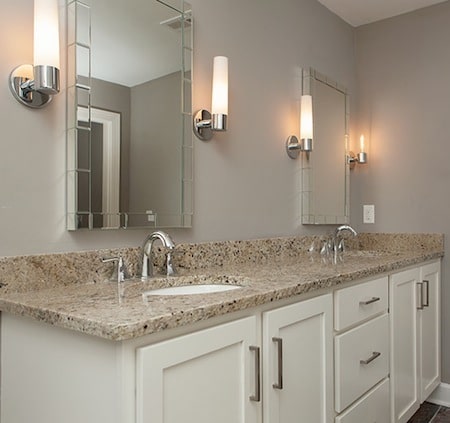
If you want to upgrade your laminate countertops, as so many of us do, still working to undo the Formica craze that began in the 1920s, you’ll likely be deciding between granite and quartz, although marble and soapstone, even concrete, are other popular options nowadays. There are merits to both granite and quartz, and you’ll find that both are really durable, heavy, and have that gorgeous sheen and luxurious look that makes people so bonkers for them. However, granite countertops require more maintenance than you might think, can be susceptible to stains, and are even slightly controversial because of their rumored radar content. But granite remains a more “natural” option than quartz. Want to know which is best? Read on.

We just finished flipping a house in Inglewood—at 1004 Preston Drive; that’s the house pictured throughout this post, and we chose to go with granite in both the master bathroom and the kitchen. Granite is definitely the more popular of the two materials but quartz has its advantages, too. Here’s how the two compare:
—Both are natural stones, but granite is the most natural—100 percent natural, to be exact. Granite comes from rock quarries and, aside from cutting it to size and polishing it, is not fussed with much, whereas quartz countertops have usually been engineered, mixed with color pigments and polymer resins, making it anywhere from 93 to 97 percent “natural” on average.
—Neither granite nor quartz could be classified as “affordable.” First, removing them from rock quarries is extremely arduous, requiring the use of drills, torches, even dynamite. Next comes the process of polishing and cutting the granite. And much of it comes from overseas. Heavy as it is, transporting it can cost quite a bit. After all, a crane has to transport it onto an ocean vessel, which then may go on to travel for five to six weeks before reaching the U.S. This lengthy process means you have to cough up big bucks to get your hands on either quartz or granite.
—Quartz countertops offer homeowners far more color options than granite, but granite countertops are marked with flaws, imperfections, and variations that many homeowners enjoy, while quartz is engineered to have a uniform appearance.
—Quartz doesn’t need to be sealed or re-sealed, unlike granite countertops, which should be sealed right after installation and then re-sealed periodically.
—Quartz countertops are more durable and less porous than granite, which can be stained by things like red wine or cooking oil. Quartz can be susceptible to damage from heat, however. The fact that quartz is non-porous makes it more difficult for bacteria, mold and mildew to grow, so that it’s great in bathrooms and kitchens. Damage to granite countertops is sometimes repairable, while damage to quartz cannot be undone.
—As far as pricing goes, granite and quartz are very much comparable in price, ranging from $50 to $200 per square foot.
—Both granite and quartz contain small amounts of radon, a radioactive gas linked to lung cancer, but granite contains more, which is part of the reason it requires a sealant. Though most studies have found “almost no” or “very little” radon in either granite or quartz countertops, its existence, even marginally, has made these countertops somewhat suspect in the past.
Knowing all the pros and cons, which stone would you prefer to have on your countertops?














